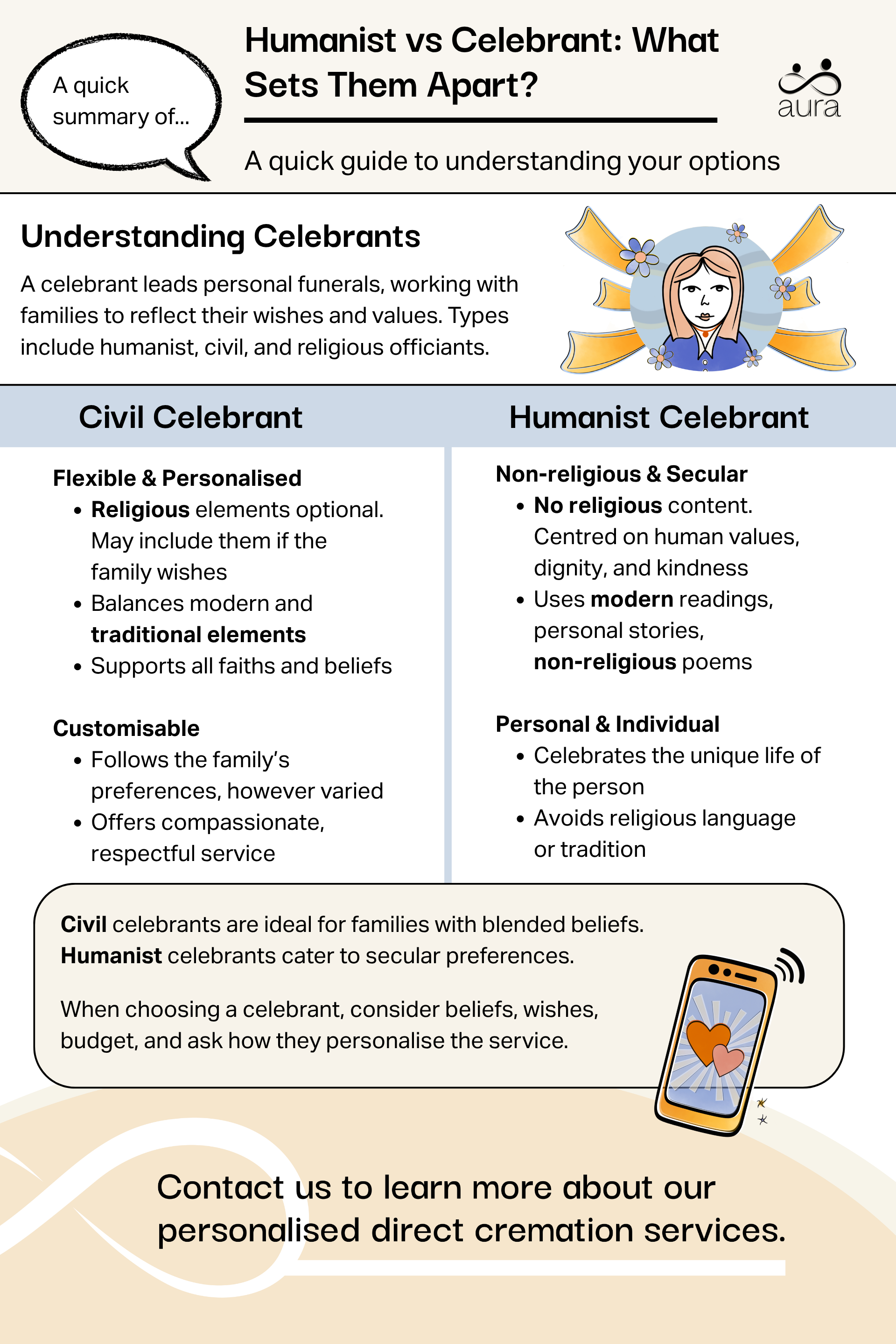


Written by Emily Cross.
17 minute read

There are some of us who feel that a more traditional funeral may not be right, whether due to culture, deeply held beliefs, or simply the wishes of the person who has died. While moving away from tradition may feel like a liberating act that allows for a more personal experience, it’s understandable if you are left with more questions than answers in the beginning.
One of the most common decisions people organising such a funeral will encounter is whether to choose a civil celebrant or a humanist celebrant. Because sometimes a simple search online for a term or definition doesn’t provide all of the details and nuances you need to make an important decision, we want to be here to help.
We hope you’ll find it helpful to read this guide on different funeral celebrants, and please don’t feel any pressure to read it now or in one go. We simply want to leave you with a comprehensive resource that is here when you need it.
Key takeaways:

Whether you wish to hire a humanist celebrant or a civil celebrant, a little background may prove helpful in clarifying your thinking. While religious officiants will conduct traditional religious funerals in crematoriums and religious places of worship, a celebrant is more focused on a personal, flexible approach.
The primary role of the celebrant is leading and organising funeral ceremonies that are personal and flexible in that they don’t necessarily have to follow religious and cultural traditions. To carry out this duty, celebrants will actively support families by delivering meaningful, bespoke services that align with their beliefs, wishes, and intentions.
Celebrants can perform both religious and non-religious ceremonies, depending on the family’s wishes. There are different types of celebrants, with civil celebrants typically offering the flexibility to include certain religious components and elements into an otherwise non-traditional service. Humanist celebrants focus on non-religious services that are flexible in format and location.
In light of the previous mention of civil celebrants and humanist celebrants, we feel it’s important we take an inclusive approach while creating this guide. There are, of course, those amongst us who have strong beliefs on death and funerals and wish to mourn in a way that is aligned with their chosen faith.
A celebrant is known as an ‘officiant’ in the context of a religious funeral service and you will rarely see the term ‘religious celebrant’ used. Examples of a religious officiant include a priest, iman, or rabbi and they will typically conduct the service in the relevant place of worship. Although the services they give will typically be more traditional, they will be vastly experienced in working with the family to adapt to their wishes and accommodate any special requests that may help with the grieving process.

A humanist is someone who focuses on human values, dignity, and reason—typically without reference to religion. In the context of funerals, a humanist ceremony is non-religious and celebrates the life of the person who has died through personal stories, perhaps modern funeral songs, non-religious funeral poems and readings. It’s about remembering the individual, not a faith.
A humanist celebrant is a trained professional who will conduct a non-religious funeral in accordance with the wishes of the family. This may take the form of one of our celebration-of-life ideas or it may be something else entirely. The point is that a humanist celebrant will be flexible in terms of how they conduct and deliver the service.
A humanist service is, by definition, secular, and therefore it will always be free from any religious traditions, rituals, or practices. Instead of prayers or popular funeral hymns, the service will typically be built around the ethical values of the person who has died followed by a celebration of their life or a memorial service.
Although to some this may represent a strong break from expected tradition, to others it will feel completely natural. Neither is right or wrong, and it just serves to show that we are all unique and have our own wishes and beliefs. While a humanist ceremony avoids religious references, the focus is always on being deeply respectful through a personal act of remembrance.
Humanist celebrants will typically aim to reflect the person’s individuality, tell part of their life story, and help those in attendance reflect on their legacy. It is a varied role that requires patience, compassion, and understanding as the family may well be processing a complex range of emotions.
Humanist celebrants work closely with families to help shape a service around the values and life experiences of the person who has died. They will act as a sounding board and a listening ear that is always available to make suggestions if the family is struggling to decide how they wish to proceed.
The celebrant will typically make suggestions that include personal stories, music, readings, and tributes, but not the reading of religious rites. Their role here is to provide the family with time and space, but also with ideas that they may wish to reflect on a little further. The result is always intended to be a ceremony that is able to offer emotional comfort while respecting a non-religious worldview or belief system.
Because of the common word ‘celebrant’ and the way it is sometimes used interchangeably with ‘civil celebrant’ understanding the nuances may prove difficult.
Humanist celebrants conduct entirely non-religious ceremonies that are rooted in personal values, human compassion, and the expressed beliefs of the person who has died. This is different from civil celebrants who may include prayers, hymns, or other spiritual elements if directed to do so by the family. An example may serve to highlight the difference.
Consider the case where a humanist from a religious family dies: an otherwise non-traditional funeral may include a short hymn or prayer to accommodate the wishes of the parents of the person who has died. In this case, hiring a civil celebrant instead of a humanist celebrant would be the more appropriate choice.
A religious officiant, while taking a personal approach, will also be bound by traditions and rituals. To those of a particular faith, this may provide a source of comfort and is to be welcomed, but it may not feel like the right choice for everyone.
Hiring a civil celebrant or a humanist celebrant takes what is typically a service based on mourning and often chooses to turn it into more of a celebration of life. The tone may still be understated and the intention of the service is always to be respectful, but you may find that focusing on the memories you have created with the person who has died, rather than mourning their absence, feels right.
A humanist celebrant may also be asked to include specific mentions of the humanist worldview and how it touched the life of the person who has died. If this is the case, they will typically focus on human values of kindness and compassion and how we are all part of nature on some level.
There are a number of personal decisions that need to be made at this point. Finding someone aligned with your belief system and who you feel comfortable talking with is perhaps the most important. As part of your decision-making process, you may also find it helpful to create a budget and factor in things such as the cost of a funeral celebrant and the cost of direct cremations where applicable.
While this list is by no means exhaustive, you may find that it helps you gather much of the background you need to make a decision on who to hire:
You may find that using these questions as a starting point helps you to feel comfortable with a prospective celebrant to the point where additional questions begin to flow naturally. They are adept at dealing with people in heightened states of emotion, or who are learning how to deal with grief, and may be beginning their journey with the five stages of grief.
Clear and transparent communication is what will ensure that the ceremony is respectful, appropriate, and well-organised on every level. The celebrant will work closely with the funeral directors and anyone else in charge of the venue to bring the service together. This is why hiring a celebrant that you feel comfortable talking with and have faith in may make a real difference.
You want to know that you can communicate your wishes to the celebrant and they will then be passed down to all of the relevant parties. For this reason, you will typically find that every celebrant you contact will recommend a series of pre-ceremony meetings and planning discussions with the family.
While it is understandable if you find the prospect of engaging in these types of talks daunting or overwhelming, you may find that doing so helps with the grieving process. It may be the case that you find new ways of expressing how you feel and reflecting on the death in the family by talking to a trained professional about practical matters.
Sometimes it can be helpful to put definitions and explanations to one side and instead focus on everyday practical matters. Understanding the specific role of a humanist celebrant may be a little easier by looking at specifically what type of language they may use.
Humanism, while not a religion, is a system of beliefs that believes in the beauty of the individual, the wonder of nature, and the importance of values such as kindness and compassion. Humanist services are characterised by the use of warm, personal language that is much more aligned with the idea of celebrating a life well lived than it is mourning the death of a loved one. They may even highlight what is beautiful about death.
There are different types and branches of humanism, just as there are with every faith and religion, and each one will view things slightly differently. Some may be more personally spiritual (but without any supernatural elements) while others may be more empirical and pride themselves on seeing the world rationally and scientifically.
By its very nature, humanism is inclusive and designed to bring people together rather than to draw divisions on sectarian lines. The language will be chosen to include all of those in attendance, regardless of their own faith, in a way that celebrates the beauty and timeless nature of life itself. By seeing life as something that extends beyond the individual, humanists often feel a deep connection with nature and the world around them.
Funeral arrangements disagreements may sometimes arise when planning a service that reflects differing beliefs.
A humanist celebrant may be a choice that those without religious beliefs wish to consider, as the service is normally focused more on the personality and character of the person who has died. That said, it is important for everyone reading this—religious or otherwise—to know that humanist services are still very respectful and comforting to those in attendance.
Because not everyone may be familiar with humanism, you may wish to discuss your choice of celebrant with close family during preparations for the funeral. Finding a kind and caring choice of words that highlights how you want the service to be about celebrating the life of the person who has died, as opposed to potentially dismissing religious sensibilities, may be the best course of action.
When you decide that you want to do something non-traditional, it’s understandable if you start to think about the legal status of what you’re doing.
As with all types of funerals, there is no need for legal recognition. This makes the question of the legal status of humanist funerals in England, Wales, Scotland, and Northern Ireland something of a moot point.
While funerals do not require legal officiation — it’s the death certificate that legally recognises death — legal status can matter in the case of weddings. A wedding is different from a funeral because it’s the act of signing the marriage certificate in the presence of witnesses that makes the marriage legally binding.
The celebrant career pathway in the UK is clearly laid out and highly transparent. Training courses by Humanists UK, and other organisations, set out a clear set of professional standards that ensure every accredited celebrant is well-versed in all of the matters they will be dealing with.
Their training will typically involve things such as:
Although training is not a mandatory requirement, many diligent celebrants will choose to dive deeper into their chosen profession and commitment to lifelong learning and self-improvement exercises.
We want you to know that we are always here to help and that we can do so in a variety of different ways. We offer prepaid funeral plans for those looking to organise their affairs while they are still alive and we also have resources that compare funeral plans that may help you to clarify your thinking. As a family-run funeral provider with a passion for what we do, we are committed to connecting you with the help you need.
If you decide that you wish to follow the path of hiring a celebrant so that you can create a highly flexible, personal service, we can offer resources that will show you how to organise a low-cost cremation. It’s all part of our approach to direct cremations; our goal is to help you remember the person who has died in a way that feels right.



What is the difference between a humanist celebrant and civil celebrant?
Humanist celebrants focus on conducting non-religious ceremonies that follow the principles and values of humanism. They do not include any form of religious ritual or tradition and are popular with those who want a secular service that welcomes everyone who wishes to pay their respects and mark a death. Their services are highly personalised and not constrained by the traditions that may typically be present in a religious service.
A civil celebrant also offers a highly personalised and inclusive service, but they may also include religious elements at the direction of the family. They aim to follow the wishes of the family down to the finest detail and deliver a service befitting the memory of the person who has died.
What is a humanist?
A humanist is someone who lives by values such as reason, kindness and compassion, without following any religion or belief in the supernatural. Humanists tend to see meaning in life through human connection and shared experience, rather than faith or spiritual teachings.
What is a humanist celebrant?
Humanist celebrants are trained professionals who deliver funeral services that are personalised, flexible, and free from any form of religious tradition. They may be chosen by families who are religious, undecided, humanist, or atheist and are known for their flexible approach.
Who should I choose: A humanist celebrant or a civil celebrant?
This very much depends on the type of service you want to have and the feelings of the person who has died. If they identified as a humanist or expressed a strong wish for no religious elements, a humanist celebrant may be the right choice. If you want to focus more on a personal service that has the option to include select religious elements, you may find that you feel more comfortable with a civil celebrant.
Can a celebrant include religious content in a funeral?
Yes, a celebrant will take pride in delivering a flexible and adaptable service that meets the needs and wishes of the family. A family who wants to add religious elements to an otherwise non-traditional service will typically hire a civil celebrant rather than a humanist celebrant, as the latter will chiefly focus on services free from religious elements.
Is a humanist funeral right for non-religious individuals?
If you are marking the life and death of someone who is not religious, whether they were agnostic or a staunch atheist, you may find that a humanist funeral feels right. By removing the religious elements and delivering a secular service, you may be able to adhere to the final wishes of your loved one. Other families may simply decide that they have no strong feelings about religion either way and wish to have a flexible approach that is highly personal.
How do celebrants personalise services?
Both types of celebrants will be compassionate and caring individuals experienced in getting to know the person who has died by talking to the family and next of kin. They listen to the wishes of the family, present ideas on how they may wish to personalise the service, and work to create an order of events that is aligned with the initial discussions. They will also be used to dealing with people who are grieving and will know that a soft touch and a listening ear can be needed at what is a difficult time.
Do funeral celebrants work with different faiths?
Yes, a civil celebrant will work with people of different faiths and those of no faith. A humanist celebrant will typically focus on delivering services for people who view themselves as humanists and those who are not religious. They offer flexible alternatives to traditional religious officiants for families who may feel that is not the right choice for them.
What is included in a humanist ceremony?
A humanist funeral, while free from any form of religious tradition or ritual, will typically follow a similar course with readings, music, and eulogies forming the major components. The point here is that the celebrant will allow the family to change and adapt this standard starting point any way they wish, allowing for a more personal service than one that is more traditional.
staging site last replicated: MISSINGNO.